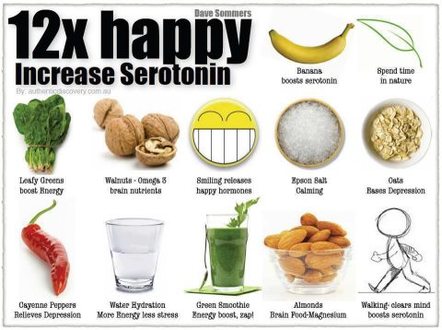
A presentation video, geared towards medical doctors, explores the relationship between the enzyme, serotonin, and its receptors in the gut, and Irritable Bowel Syndrome. The purpose of the video presentation was to visually convey this complex, yet fundamental mechanism, in hopes of creating new therapies for the treatment of IBS. Extensive knowledge of the workings of the gastrointestinal system and associated neural network was required in order to accurately depict the abstracted, microscopic spaces.
Below is a discussion of some of the natural ways that you can boost your serotonin levels to get feeling happy, fulfilled, and energized again.
Though serotonin is typically recognized as a brain chemical, the majority of this neurotransmitter is produced in our digestive tract. Serotonin exerts powerful influence over mood, emotions, memory, cravings (especially for carbohydrates), self-esteem, pain tolerance, sleep habits, appetite, digestion and body temperature regulation. It is often thought of as our “happy hormone,” especially because its production increases when we’re exposed to natural sunlight. And let’s face it, after months of being stuck indoors, most Canadians are battling low serotonin levels come springtime.
Production of serotonin is closely linked to the availability of vitamin B6 and the amino acid tryptophan. If our diet lacks sufficient protein and vitamins, we run a greater risk of serotonin deficiency. We may experience a dip in serotonin in relation to physiological causes, dieting, low protein intake, digestive disorders and also stress, since high levels of the stress hormone cortisol rob us of serotonin. When we measure our current lifestyle against all the elements necessary for the body’s natural production of serotonin, the wide-ranging epidemic of low serotonin is certainly not surprising. Add in chronic stress and out-of-control multitasking — two of the main causes of serotonin depletion — and it’s no wonder many of us suffer from depleted serotonin.
Natasha Turner, N.D. is a naturopathic doctor;
In my professional opinion, serotonin deficiency has become an epidemic of equal proportion to obesity. I also believe this parallel is no coincidence. Lets take a look at what you can do to ensure you keep your serotonin levels up:
1. Start pretending it’s summer
By this I don’t mean put on shorts and sandals and stand outside shivering — although the weather’s slowly creeping up. What you can do is engage in activities that get you excited for the warmer weather like planning your summer vacation (with a countdown on a calendar), booking some time at a cottage, confirming camping weekends, going for a pedicure (after a winter hiding in boots everyone needs a good pedicure) and even rescuing the barbeque from hiberation. I know the smell of a barbecue makes me feel like summer is coming.
2. Alleviate sadness with 5-HTP
A derivative of tryptophan, and one step closer to serotonin, 5-Hydroxytryptophan (5-HTP) has been found to actually be more effective than tryptophan for treating sleeplessness, depression, anxiety and fibromyalgia. As an added bonus, it has a positive influence on your weight and can curb an out of control appetite – another reason why it’s a great supplement going into the warmer months. In one Italian study, women who took 5-HTP lost 10 pounds over 12 weeks, compared to two pounds in the placebo group.
3. Calm your brain with a B vitamin
I recommend that my patients keep a B-complex at their desk during times of stress. High total intakes of vitamins B6 and B12 are associated with a lower risk of depressive symptoms over time in community-residing older adults, according to the results of a cohort study reported in the American Journal of Clinical Nutrition. Vitamin B6 in particular supports the production and function of serotonin, melatonin and dopamine in the brain.
4. Smile with St. John’s Wort
This herb has been proven effective for easing mild to moderate depression. It appears to work as a natural SSRI (selective serotonin re-uptake inhibitor) by preventing the breakdown of serotonin in the brain.
5. Add inositol to your smoothies
Naturally present in many foods, inositol improves the activity of serotonin in the brain. As a supplement, it’s an excellent choice for alleviating anxiety and depression and supporting nervous system health. I use it in powdered form and add it to my daily smoothie or a glass of water before bed. Inositol is very effective for calming the nervous system when mixed with magnesium.
6. Follow the light
There’s a pretty good reason that Canadians love their patios – after being stuck inside all winter, we can hardly wait to get some fresh air and sunlight. Heading into the sunshine, even on a cool day, is the quickest way to boost your mood (and burn some belly fat). If you do this first thing in the morning on an empty stomach you will not only burn 20 percent more calories, you’ll jumpstart your mood for the entire day.
Find out what makes you feel good and put it into action. | Head out for a morning walk to boost your serotonin levels.


